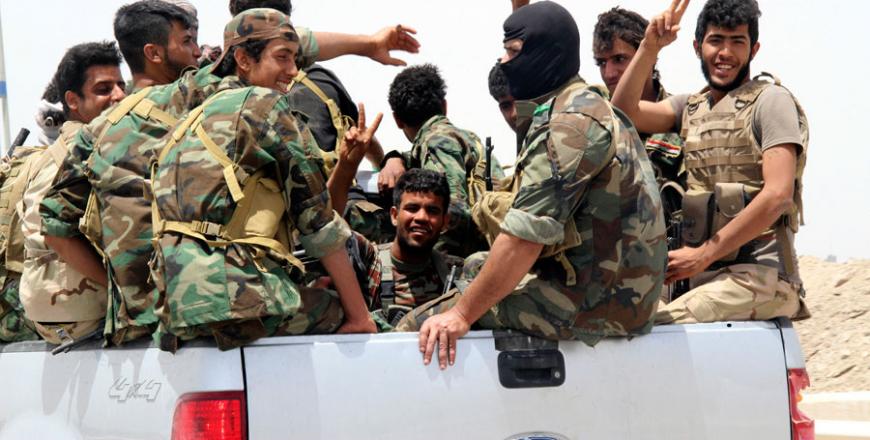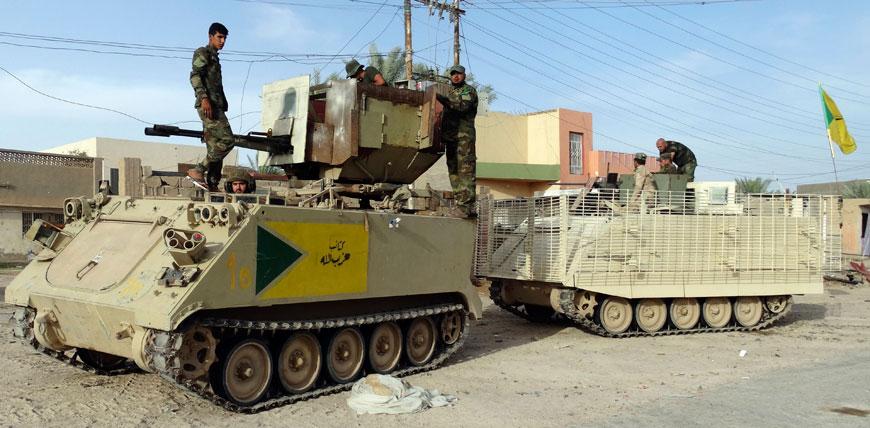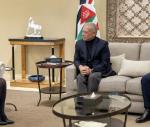You are here
Iraq launches operation to drive Daesh from Anbar
By AP - May 26,2015 - Last updated at May 26,2015

Shiite militiamen arrive in Khalidiya to support Sunni tribal fighters and local policemen as they defend their city against Daesh militants, 100 kilometres west of Baghdad, Iraq, on May 23 (AP photo)
BAGHDAD — Iraq on Tuesday announced the launch of a major military operation to drive Daesh from the western Anbar province and retake the Sunni heartland where the extremist group captured the provincial capital, Ramadi, earlier this month.
The operation is backed by Shiite militias and Sunni pro-government fighters, the Iraqi state TV reported, without providing further details. There was no indication of any immediate movements on the ground following the announcement.
Daesh seized large parts of Anbar in early 2014 and captured Ramadi earlier in May — a fall that marked a major defeat for Iraqi forces, which had been making steady progress against the extremists over the past months with the help of US-led air strikes.
The operation comes just days after US officials, including Defence Secretary Ash Carter, criticised the Iraqi forces, saying their men fled the Daesh advance on Ramadi without fighting back, leaving behind weapons and vehicles for the extremists.
But Baghdad defended its troops and quickly said military preparations were under way to launch a large-scale counter-offensive in Anbar, involving Iranian-backed Shiite militias.
That possibility sparked fears of potential sectarian violence in the Sunni province, long the scene of protests and criticism against the Shiite-led government in Baghdad.
A spokesman for Iraq’s Shiite militias said Tuesday the operation would “not last for a long time” and that Iraqi forces have surrounded Ramadi from three sides.
New weapons are being used in the battle “that will surprise the enemy”, Ahmed Al Assadi, who is also a member of parliament, told reporters. He added there was also another operation underway, north of the nearby province of Salahuddin.
According to plans, forces fighting in Salahuddin would surround Ramadi from its northeastern side, he added.
The Anbar operation aims at cutting off supply routes and recapturing the outskirts of Ramadi first — not the city itself, according to provincial councilman Faleh Al Issawi and tribesman Rafie Al Fahdawi.
The two told The Associated Press that there was ongoing fighting and air strikes west and south of Ramadi on Tuesday, adding that more Sunni fighters will be armed starting from Wednesday to join the battle.
Security forces and Sunni militiamen who had been battling the extremists in Ramadi for months collapsed as Daesh fighters overran the city earlier this month.
The militants gained not only new territory 115 kilometres west of Baghdad, but also large stocks of weapons abandoned by government forces as they fled.
Carter said Sunday that Iraqi forces had “vastly outnumbered” the Daesh militants in Ramadi but “showed no will to fight”.
Saad Al Hadithi, a spokesman for Iraq’s Prime Minister Haider Al Abadi, said the government was surprised by Carter’s remarks, and that the defense secretary “was likely given incorrect information”.
Al Abadi had called on Shiite militias to help Iraqi troops retake the Sunni province. The militiamen have played a key role in clawing back territory from the Daesh elsewhere in Iraq, but rights groups and Sunni residents have accused them of looting, destroying property and carrying out revenge attacks — especially after government forces recaptured the city of Tikrit early last month. Militia leaders deny the allegations.
The participation of the Shiite militias, known as Popular Mobilisation Unites, in the operation in the Sunni Anbar risks exacerbating sectarian tensions as some of the militias took part in retaliatory sectarian killings that roiled Iraq in 2006 and 2007.
Distrust of the Shiite-led government runs deep in the Sunni Anbar province, where US troops fought some of their bloodiest battles since Vietnam and only succeeded in rolling back militants when Sunni tribesmen and former insurgents rallied to their side as part of the Sahwa, or Awakening, movement beginning in 2006.
After the US troops’ withdrawal, the government has largely ignored the Sahwas and Sunni anger at Baghdad has steadily grown.
Related Articles
BAGHDAD — Iraq has for the first time deployed troops trained by the US-led coalition in their campaign to retake the city of Ramadi from Da
BAGHDAD — A senior Daesh figure known as “the blind judge” has made an appearance in the Iraqi city of Ramadi, asserting the militant group’
BAGHDAD/BEIRUT — After only modest gains in the first few weeks of their drive to retake Anbar province, Iraqi government forces have given
















